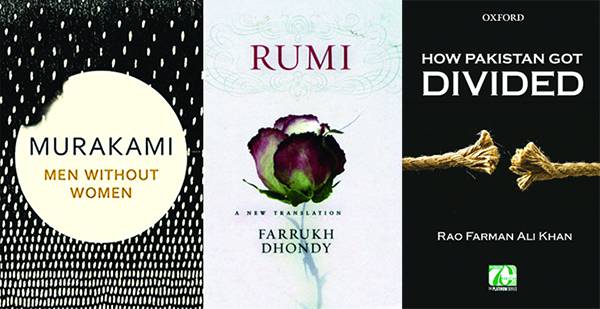
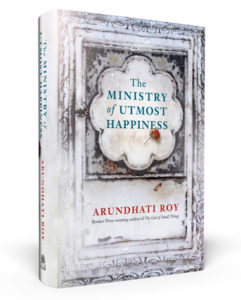
The Ministry of Utmost Happiness: A novel
Arundhati Roy
Hamish Hamilton (2017)
Rs1,095
The Ministry of Utmost Happiness takes us on an intimate journey of many years across the Indian subcontinent—from the cramped neighborhoods of Old Delhi and the roads of the new city to the mountains and valleys of Kashmir and beyond, where war is peace and peace is war.
It is an aching love story and a decisive remonstration, a story told in a whisper, in a shout, through unsentimental tears and sometimes with a bitter laugh. Each of its characters is indelibly, tenderly rendered. Its heroes are people who have been broken by the world they live in and then rescued, patched together by acts of love—and by hope.
The tale begins with Anjum—who used to be Aftab—unrolling a threadbare Persian carpet in a city graveyard she calls home. We encounter the odd, unforgettable Tilo and the men who loved her—including Musa, sweetheart and ex-sweetheart, lover and ex-lover; their fates are as entwined as their arms used to be and always will be. We meet Tilo’s landlord, a former suitor, now an intelligence officer posted to Kabul. And then we meet the two Miss Jebeens: the first a child born in Srinagar and buried in its overcrowded Martyrs’ Graveyard; the second found at midnight, abandoned on a concrete sidewalk in the heart of New Delhi.
As this ravishing, deeply humane novel braids these lives together, it reinvents what a novel can do and can be. The Ministry of Utmost Happiness demonstrates on every page the miracle of Arundhati Roy’s storytelling gifts.
Arundhati Roy is the author of a number of books, including The God of Small Things, which won the Booker Prize in 1997 and has been translated into more than forty languages. She was born in 1959 in Shillong, India, and studied architecture in Delhi, where she now lives. She has also written several non-fiction books, including Field Notes on Democracy, Walking with the Comrades, Capitalism: A Ghost Story, The End of Imagination, and most recently Things That Can and Cannot Be Said, co-authored with John Cusack. Roy is the recipient of the 2002 Lannan Foundation Cultural Freedom Prize, the 2011 Norman Mailer Prize for Distinguished Writing, and the 2015 Ambedkar Sudar award.
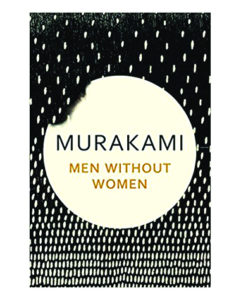
Men without Women
Haruki Murakami
Harvill (2017)
Rs1,545
A dazzling new collection of short stories–the first major new work of fiction from the beloved, internationally acclaimed, Haruki Murakami since his #1 best-selling Colorless Tsukuru Tazaki and His Years of Pilgrimage.
Across seven tales, Haruki Murakami brings his powers of observation to bear on the lives of men who, in their own ways, find themselves alone. Here are vanishing cats and smoky bars, lonely hearts and mysterious women, baseball and the Beatles, woven together to tell stories that speak to us all.
Marked by the same wry humor that has defined his entire body of work, in this collection Murakami has crafted another contemporary classic.
Haruki Murakami was born in Kyoto in 1949 and now lives near Tokyo. His work has been translated into more than fifty languages, and the most recent of his many international honors is the Jerusalem Prize, whose previous recipients include J. M. Coetzee, Milan Kundera, and V. S. Naipaul.
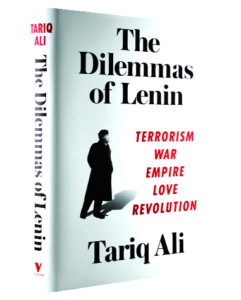
The Dilemmas of Lenin: Terrorism, War, Empire, Love, Revolution
Tariq Ali
Verso (2017), Rs2,095
On the centenary of the Russian Revolution, Tariq Ali paints an illuminating portrait of Lenin. “Without Lenin there would have been no socialist revolution in 1917. Of this much we can be certain.” Vladimir Ilyich Lenin, leader of the October 1917 uprising, is one of the most misunderstood leaders of the twentieth century. In his own time, there were many, even among his enemies, who acknowledged the full magnitude of his intellectual and political achievements. But his legacy has been lost in misinterpretation; he is worshipped but rarely read.
On the centenary of the Russian Revolution, Tariq Ali explores the two major influences on Lenin’s thought—the turbulent history of Tsarist Russia and the birth of the international labour movement—and explains how Lenin confronted dilemmas that still cast a shadow over the present. Is terrorism ever a viable strategy? Is support for imperial wars ever justified? Can politics be made without a party? Was the seizure of power in 1917 morally justified? Should he have parted company from his wife and lived with his lover?
In The Dilemmas of Lenin, Ali provides an insightful portrait of Lenin’s deepest preoccupations and underlines the clarity and vigour of his theoretical and political formulations. He concludes with an affecting account of Lenin’s last two years, when he realized that “we knew nothing” and insisted that the revolution had to be renewed lest it wither and die.
Tariq Ali has written more than two-dozen books on world history and politics—the most recent of which are The Clash of Fundamentalisms, The Obama Syndrome and The Extreme Centre—as well as the novels of his Islam Quintet and scripts for the stage and screen. He is a long-standing member of the editorial committee of New Left Review and lives in London.
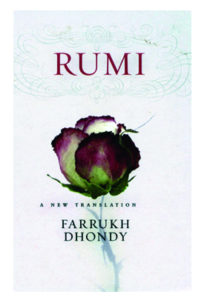
Rumi: A New Translation
Farrukh Dhondy
Harper Collins (2011)
Rs795
Marked by lyrical beauty and spiritual insight, a deep understanding of human suffering that coexists with rapturous abandon, the poems of Jalaluddin Rumi continue to be relevant almost eight centuries after they were composed, with contemporary audiences finding new meanings in them. Rumi’s poems bring together the divine and the human, the mystical and the corporeal to create a vivid kaleidoscope of poetic images. While many recent ‘translations’ have sought to give Rumi’s poetry a certain hippy sensibility, robbing it of its true essence, Farrukh Dhondy attempts to bring out the beauty and sensibility of the verses whilst imitating the metre of the original. Dhondy’s translations provide a modern idiom to the poems, carefully keeping intact their religious context.
A great spiritual master and poet, Jalaluddin Rumi was born in Wakhsh (Tajikistan) in 1207 to a family of learned theologians. He founded the Mawlawi Sufi order, a leading mystical brotherhood of Islam. He is also the author of the six-volume epic work, the Mathnawi, which has been referred to as the ‘Koran in Persian’.
Farrukh Dhondy was born in 1944 in Pune. He is the author of a number of books including East End at Your Feet (1977), Poona Company (1980), Bombay Duck (1990) and The Bikini Murders (2008). He has also written screenplays for film and television, including Split Wide Open (1999) and The Rising: Ballad of Mangal Pandey (2005).
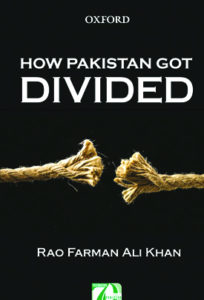
How Pakistan got Divided
Rao Farman Ali Khan
OUP (2017)
Rs1,150
The book is an eyewitness account of the events that led to a civil war in East Pakistan, which culminated in the creation of Bangladesh. It is written by Major General Rao Farman Ali Khan, a well-known army officer present in the Eastern Wing during the war of 1971. His experience of the Eastern Wing spanned almost five years; in the latter three years (1969–71), he held the key appointment of Advisor on Civil Affairs to the Governor of East Pakistan. By virtue of this role, and the length of his tenure in East Pakistan, he acquired deep insight and knowledge of the political and military events as they unfolded.
In this candid account, Rao Farman Ali brings to light the political undercurrents and aspects of the military conflict generally not known. His personal interactions with both, the Bengali and West Pakistani politicians, as well as the military commanders, gave him a unique vantage point to analyse the events and decisions taken that led to the fateful day—16 December 1971—the division of Pakistan.
Born in Kalanaur, India, Rao Farman Ali Khan (1922–2004) was educated in Okara, Ambala, and Lahore. He was commissioned into the 1st Mountain Royal Artillery Regiment in 1942 and served the British Allied Forces at the Burma front and Japan. After opting for the Pakistan Army in 1947, he attended the Staff College at Camberley, UK (1952) and the Gunnery Course at Fort Leavenworth, USA (1956).
After various important staff and command assignments, Rao Farman Ali was posted to East Pakistan, where he served in Dacca as Commander Artillery 14 Division (1967–69), and as Advisor on Civil-Political Affairs to successive governors (1969–71). He was promoted to Major General in 1970. Following the surrender at Dacca (1971), Rao Farman remained prisoner of war (POW) in India until 1974. After repatriation, he was appointed Director General Military Training (DGMT).
Later, as MD Fauji Foundation (1975–85), Rao Farman turned the company into a commercial giant by strategically redirecting it towards the fertilizer and hydrocarbon sector, setting up Fauji Fertilizer Company (FFC). He retired from the army in 1976. He also served as Federal Minister for Petroleum and Natural Resources (1981–83).

